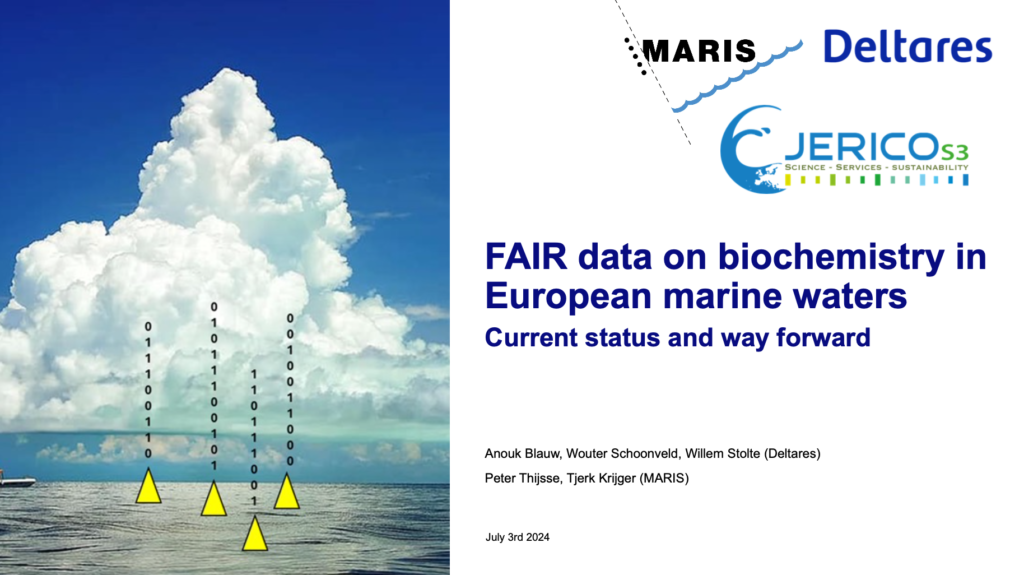The webinar on FAIR data on biochemistry in European marine waters (3rd July 2024), presented by Anouk Blauw (Deltares), and Peter Thijsse and Tjerk Krijger (MARIS), highlighted the importance of ocean observation data in understanding the impact of changes in marine waters. The changes, driven by factors such as climate change, biodiversity loss, and increased use of marine waters, affect the natural ecosystem, biodiversity, conditions for ecosystem services like aquaculture and fisheries, and safety through flood risks and coastal erosion.
The webinar aimed to share lessons from the JERICO-S3 project on data collection, management, and use, provide an overview of the European FAIR data management landscape, evaluate the adequacy of current data flow to European information services, and identify bottlenecks and potential solutions. Policy assessments, hampered by limited observation data due to insufficient observations and the inability to use existing observations (due to factors like unknown quality, inaccessibility, or being hidden), require representative and reliable data with quality control, transparency, and consistency. The absence of a European portal for land-based inputs of nutrients and pollutants further complicates assessments, necessitating observations at river mouths of discharges and pollutant concentrations.

View the video here:
FAIR Data on Biochemistry in European Marine Waters
Download the presentation here:
 JERICO FAIR biochemistry data webinar (2.0 MiB)
JERICO FAIR biochemistry data webinar (2.0 MiB)
To address these concerns, Europe has established initiatives like the COPERNICUS programme, which utilises satellite, model, and in-situ data for research, policy development, and supporting actors at sea. In-situ data, collected through long-term monitoring programmes, operational oceanography with sensors, research projects, citizen observations, and project-based monitoring for industry or infrastructures, plays a crucial role in this effort. The JERICO-RI project, focusing on long-term sensor observations, collects interdisciplinary data (physics, chemistry, biology, and meteorology) from various platforms like buoys, ferryboxes, fixed platforms, HR radar, and gliders.
FAIR data principles (Findable, Accessible, Interoperable, Reusable) are increasingly essential for research and observation data, driven by factors like the Marine Strategy Framework Directive Reporting, the need for reliable data, data gaps, Digital Twin developments, internet and cloud processing possibilities, research requirements, and growing data availability. Achieving FAIRness involves making data findable and accessible through persistent identifiers in well-accessible catalogues, creating extensive metadata following EU community standards, using community-supported data exchange formats, and adding a usage license. The FAIRness process steps can be guided by the FIP wizard.
The European landscape of marine data management involves a flow of data from observation platforms to national/thematic data centres, aggregators at the EU level, intermediate users, and end-users like policymakers, students, and researchers. Thematic organisation in aggregators focuses on areas like biodiversity, carbon, near-real-time data, and biogeochemical data. To achieve FAIRness for biogeochemical data, providing data to SeaDataNet, publishing metadata following community standards, using community-endorsed vocabularies, publishing datasets in standardised formats, and adding a usage license are crucial steps. For those not connected to National Oceanographic Data centres, submitting datasets to EMODnet Data ingestion offers a potential solution, creating a DOI, allowing submission of various data types, and publishing datasets with metadata in a central catalogue. The end goal is data uptake, with all data in products being FAIR and traceable back to original files and platforms.
Ensuring FAIRness of data is critical for effective policy assessments and research in the field of biochemistry in European marine waters. The webinar emphasized the need for collaboration and adherence to established standards to enhance data management and utilisation in this domain.
